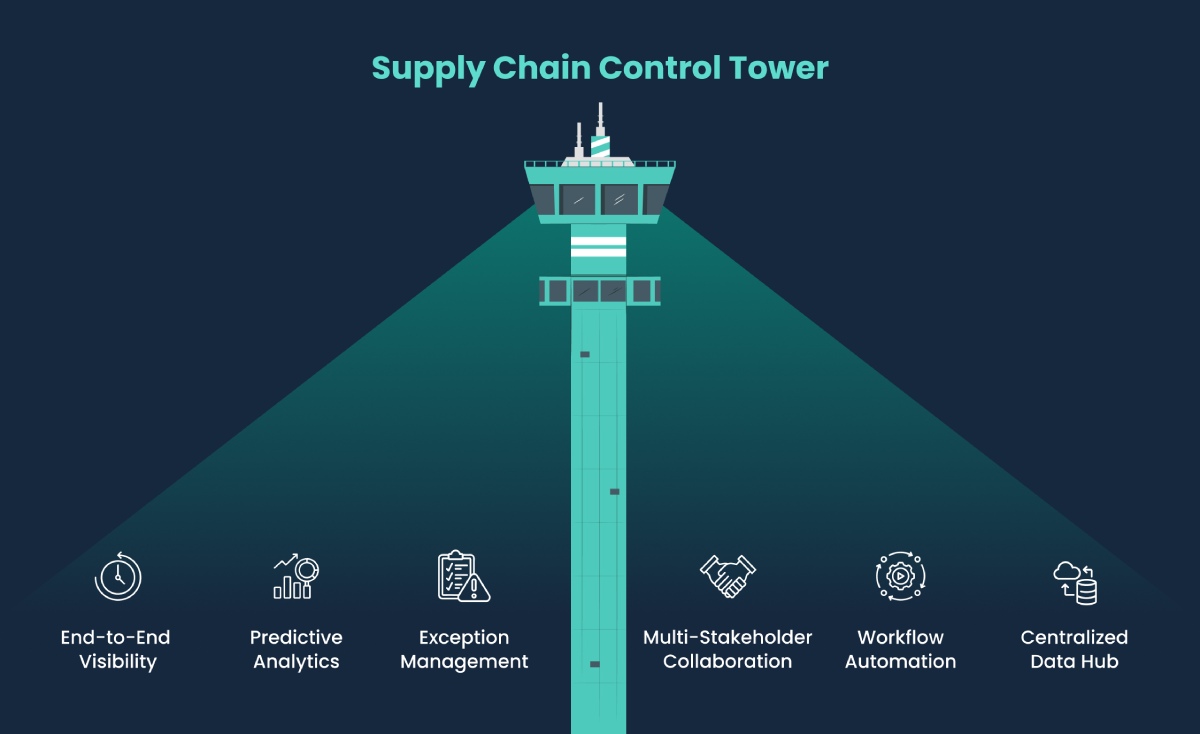A Comprehensive Guide to Supply Chain Control Towers
- Understanding
- Supply Chain Control Towers for Streamlined Operations
- Supply Chain Control Tower Solutions: Tailored for Specific Needs
- The Powerhouse Capabilities of Supply Chain Control
Towers: a Multifaceted Approach
- Real-Time Visibility with Supply Chain Control Towers
- Supply Chain Control Towers Use Data Analytics and Predictive Modeling
- Supply Chain Control Towers Address Issues Proactively
- Supply Chain Control Towers Act as A Collaborative Platform
- Workflow Automation with Supply Chain Control Towers
- Supply Chain Control Towers Help in Building Resilience
- Supply Chain Control Towers’ Advanced Functionalities for Enhanced Performance
- How to Build Supply Chain Control Towers?
- Syren’s Approach Towards Agile and Efficient Supply Chain Control Towers
- A Future Powered by Supply Chain Control Towers

In the era of hyper-globalization and tough market competition, managing intricate supply chains presents a formidable challenge for businesses. Traditional approaches, often siloed and reactive, struggle to keep up with the ever-increasing product volumes, suppliers, and constantly changing customer demands. Supply chain control towers emerge as a game-changing solution, offering a centralized platform for end-to-end visibility and control. By integrating data from across the entire supply chain ecosystem, control towers empower businesses to optimize operations, achieve greater visibility, and ultimately propel business success.
Read On: From Algorithms to Action: Learn the 5 Ways AI is Optimizing Supply Chains
Supply Chain Control Towers for Streamlined Operations
Supply chain control towers function as a unified platform that seamlessly integrates data gleaned from various sources across the entire supply chain landscape. This encompasses suppliers of raw materials, manufacturers, logistics providers responsible for transportation and warehousing, and retailers who deliver products to end consumers. By consolidating information from these disparate sources, the control towers unlock real-time insights, empowering businesses to make proactive and data-driven decisions.
Supply Chain Control Tower Solutions: Tailored for Specific Needs
The landscape of supply chain control towers offers a diversified range of solutions, each catering to specific business needs. According to IBM, the most prominent control tower types are:
Logistics/Transportation Control Towers
Logistics/transportation control towers offer real-time visibility and comprehensive insight into the movement of goods across the entire supply chain. This includes delivery data and detailed track-and-trace functionality, providing a holistic view of inbound and outbound logistics.
Fulfillment Control Towers
Acting as the central nervous system for order fulfillment, fulfillment control towers leverage data to prioritize and expedite critical orders, track their progress in real-time, and identify cost-reduction opportunities throughout the entire fulfillment process.
Inventory Control Towers
Inventory control towers provide real-time visibility into stock levels across the entire supply chain. This empowers businesses to proactively prevent stockouts, optimize inventory allocation strategies based on demand forecasts, and reduce carrying costs associated with excess inventory. Additionally, inventory control towers can facilitate smoother fulfillment processes by ensuring the right products are available at the right fulfillment centers to meet customer needs. In essence, they transform reactive inventory management into a proactive strategy, enabling businesses to anticipate and address potential issues before they disrupt operations.
Supply Assurance Control Towers
These control towers enable proactive identification and mitigation of potential supply chain disruptions, ensuring a smooth flow of materials and minimizing delays in production. By constantly monitoring supplier performance and inventory levels, supply assurance control towers also enhance lead time accuracy, ultimately guaranteeing on-time product delivery and customer satisfaction. Additionally, these towers can be instrumental in supplier relationship management, fostering communication and collaboration to improve overall supply chain efficiency and identify cost-saving opportunities.
End-to-End (E2E) Supply Chain Control Towers
Offering the most comprehensive view, E2E control towers provide complete visibility and control across the entire internal and external supply chain. This holistic approach empowers businesses to identify and address inefficiencies throughout the entire supply chain, ultimately optimizing delivery timelines, reducing costs, and enhancing customer satisfaction. E2E control towers function like a central hub, bringing together data from disparate systems and providing a single source of truth for all supply chain activities. This enables real-time decision-making and proactive risk management, ensuring a more resilient and agile supply chain.
The Powerhouse Capabilities of Supply Chain Control Towers: a Multifaceted Approach
A well-equipped supply chain control tower unlocks many capabilities, empowering businesses to navigate modern supply chains’ complexities. Here’s a closer look at some key functionalities that distinguish control towers:

Real-Time Visibility with Supply Chain Control Towers
By aggregating data from various sources, including supplier systems, manufacturing equipment sensors, and logistics tracking software, the control tower offers a holistic view of the supply chain in real-time. Businesses can track the movement of goods across every stage, monitor inventory levels across warehouses, and optimize logistics operations to ensure timely deliveries.
Read On: AI Driven Supply Chain Visibility Through Control Towers
Supply Chain Control Towers Use Data Analytics and Predictive Modeling
Advanced analytics and predictive modeling capabilities transform raw data into actionable insights. Control towers leverage these functionalities to identify areas for improvement in the supply chain, optimize operations based on historical data and current trends, and anticipate potential disruptions before they occur.
Supply Chain Control Towers Address Issues Proactively
Robust exception management is a cornerstone of control tower supply chain management. By proactively identifying and resolving issues as they arise, businesses can minimize disruptions and their impact on customer satisfaction, production schedules, and overall business continuity.
Supply Chain Control Towers Act as A Collaborative Platform
Control towers act as central communication hubs, fostering collaboration among all stakeholders within the supply chain ecosystem. This facilitates seamless communication and coordination, enabling real-time information sharing and problem-solving across departments, suppliers, and logistics partners.
Workflow Automation with Supply Chain Control Towers
Streamlining efficiency and minimizing human error are key benefits of workflow automation. Control towers automate repetitive tasks such as order processing, data entry, and inventory management. This frees up valuable human resources to focus on strategic initiatives and value-added activities.
Supply Chain Control Towers Help in Building Resilience
Proactive risk management is a critical capability of supply chain control towers. By leveraging data analytics and real-time insights, control towers empower businesses to anticipate potential disruptions or delays before they occur. This proactive approach enables businesses to implement preventative measures, such as securing alternative suppliers, diversifying transportation routes, or adjusting production schedules. This proactive risk management fosters supply chain resilience, ensuring business continuity and minimizing the impact of unforeseen challenges.
Supply Chain Control Towers’ Advanced Functionalities for Enhanced Performance
As supply chain control towers evolve, they integrate advanced functionalities to further enhance operational excellence. Here’s a look at some noteworthy advancements:
- Machine Learning for Demand Forecasting
Machine learning algorithms analyze historical sales data, consumer trends, and market fluctuations to generate highly accurate demand forecasts. This empowers businesses to optimize inventory levels based on anticipated demand, avoid stockouts, and reduce the risk of excess inventory that can lead to storage costs and product obsolescence. - Predictive Maintenance with Supply Chain Control
Towers
By leveraging sensor data from machines and equipment deployed across the supply chain, control towers can predict equipment failures. This facilitates proactive maintenance, enabling businesses to schedule maintenance activities during downtime to minimize disruptions to production or logistics operations. Predictive maintenance extends the lifespan of equipment, reduces repair costs, and ensures smooth operations. - Supply Chain Control Towers Offer Enhanced
Transparency
Transparency enables better collaboration, facilitates faster issue resolution, and reduces disputes arising from discrepancies in data. Additionally, control towers can aid in tracking the provenance of goods, ensuring product authenticity and ethical sourcing practices, which are increasingly important considerations for consumers. - Sustainability Monitoring and
Optimization
As environmental concerns gain prominence, control towers can be equipped to monitor and optimize sustainability metrics. This empowers businesses to track their carbon footprint across the supply chain, identify areas for improvement, and implement sustainable practices. This can encompass initiatives such as selecting eco-friendly packaging materials, optimizing transportation routes for fuel efficiency, and sourcing materials from suppliers with responsible environmental practices.
Read Further: How can Control Towers Help Companies in Dealing with Unpredictable Shipping Time?
How to Build Supply Chain Control Towers? A Strategic Investment With Its Share of Challenges
While the benefits of a supply chain control tower are undeniable, building a customized solution presents its own set of challenges. Here’s a closer look at some of the obstacles businesses need to consider when implementing control towers:
- Data Integration in Supply Chain
Control Towers
Integrating data from multiple sources, often residing in disparate systems and formats, can be a significant challenge. Businesses need to invest in data integration tools and expertise to seamlessly consolidate data from Enterprise Resource Planning (ERP) systems, logistics providers’ platforms, manufacturing equipment sensors, and other sources. Ensuring data quality is another critical aspect. Inaccurate or incomplete data can lead to misleading insights and hinder the effectiveness of the control tower. - Technology Expertise in Supply Chain Control Towers
Developing a custom control tower requires specialized skills in various technologies. A skilled team with expertise in data analytics, cloud computing, application programming interfaces (APIs), and cybersecurity is necessary to ensure the control tower functions effectively and securely. Businesses may need to invest in training existing staff or consider hiring personnel with the requisite technical expertise. - Cost Considerations in Supply Chain Control Towers
Building a custom control tower can be a significant investment. It’s essential to conduct a thorough cost-benefit analysis to evaluate the financial implications. Costs associated with hardware, software, technology infrastructure, personnel, and ongoing maintenance need to be factored in. However, the potential return on investment (ROI) from a control tower can be substantial. Businesses can expect to see improvements in efficiency, cost savings, and overall supply chain performance, which can translate to increased revenue and profitability. - Ensuring Adaptability in Supply Chain Control Towers
Businesses need to ensure that the control tower they implement is scalable and adaptable to accommodate these changes. A scalable control tower can be easily expanded to integrate new data sources, accommodate additional users, and support increased transaction volumes as the business grows. Additionally, the control tower should be adaptable to incorporate new technologies and functionalities as they emerge within the supply chain management domain.
Syren’s Approach Towards Agile and Efficient Supply Chain Control Towers
Syren Cloud’s Control Tower goes beyond traditional offerings, incorporating cutting-edge features like AI and ML-powered capacity planning, dynamic reporting, and advanced scenario modeling.
Our solution empowers businesses with:
- Strategic Decision
Making
Gain comprehensive visibility into enterprise performance through insightful scorecards and dashboards. - Standardized Processes
Ensure consistent and auditable execution through repeatable tasks. - Enhanced Collaboration
Foster cross-functional communication and alignment among all stakeholders. - Data-Driven Scenario Planning
Model different business strategies and measure their impact on achieving corporate goals.
Learn More: Mastering Supply Chains with Syren: Transform Manufacturing KPIs into Real-World Wins
By implementing our Control Tower, businesses can gain a significant competitive advantage. They can make informed decisions based on real-time data, optimize capacity utilization, and achieve better alignment between sales and operations. This translates into improved profitability, increased customer satisfaction, and overall business success.
A Future Powered by Supply Chain Control Towers
Supply chain control towers are rapidly transforming the way businesses manage their supply chains. By offering real-time visibility, advanced analytics, and proactive risk management capabilities, control towers empower businesses to make data-driven decisions, optimize operations, and achieve greater supply chain resilience. As technology continues to evolve and the global supply chain landscape becomes increasingly complex, the adoption of control towers is poised to become the norm for businesses seeking to thrive in a competitive and dynamic marketplace.
Fill out the form below to connect with our supply chain experts & schedule a free demo!